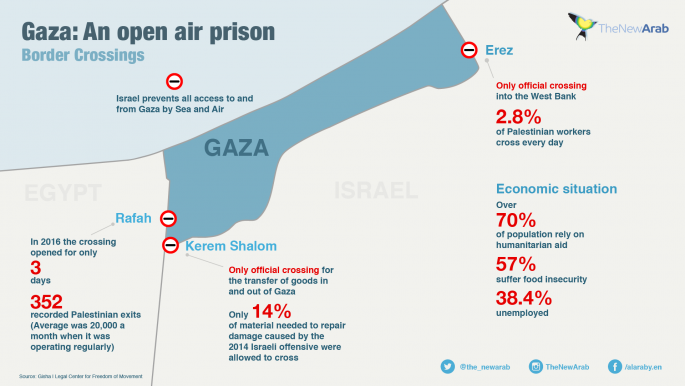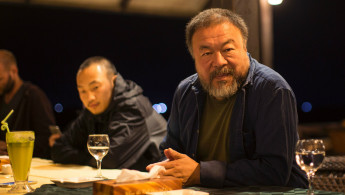Ai Weiwei visits Gaza to film refugee documentary
"Complicated feeling," the artist told AFP in English.
"I'm very happy because I'm here in Gaza, I'm here to meet the people and to interview the refugees for my documentary film on the refugee crisis.
"I visited Jabalia refugee camp, Khan Yunes, and Shejaiya area and I met people that lost houses in the (2014) war, and I visited Rafah crossing."
Ai has taken a personal interest in the thousands of refugees and migrants who have risked their lives to reach Europe, only to find their path barred by a barrage of border closures.
The activist crossed into Gaza through Israel with a crew of 10 people on Tuesday.
Ai said he is including the Palestinian refugees in the film because they constitute "the longest history" of displacement and their numbers complicate any settlement of their cause.
The number of Palestinians who were displaced in 1948, along with their descendants, is estimated at over 5 million people, according to the United Nations.
"The Palestinian refugees really play a very important factor in the whole refugee situation," the renowned artist told The Associated Press.
Ai's crew has worked on the documentary in Jordan, Turkey, Greece and several other countries that have hosted Syrian refugees.
The visit is Ai's first to Gaza, and coincides with the 68th anniversary of what the Palestinians call the "Nakba," or catastrophe caused by their displacement during the 1948 war.
| See in pictures: Ai Weiwei in Gaza |
"We have to come here to interpret this into our film," he said.
During the three-day visit, Ai and his team will be shooting in refugee camps in the Gaza Strip.
They also will look at the worsening living conditions in Gaza, which has suffered under an Egyptian and Israeli blockade.
"The condition here is unbelievable," Ai said as his crew filmed Palestinians trying to leave Gaza through Egypt, which temporarily opened its border with Gaza for two days Wednesday after nearly three months of closure. "Gaza is really suffering from this isolation and blockade from all over," he said.
Ai said the film should be complete by the end of 2016, and he will organize an exhibition with works related to refugees before the opening of the documentary.
Last month, he set up a white grand piano in the muddy, rain-drenched makeshift camp at Idomeni on the Greek-Macedonian border, allowing one of the thousands of migrants stuck there to play.
And in February, he draped thousands of life-jackets discarded by migrants arriving in Greece around the columns of Berlin's Konzerthaus concert hall.
The artist in January closed down an exhibition of his work in Copenhagen in protest after lawmakers passed a controversial bill allowing authorities to seize valuables from asylum seekers.
 |
|





 Follow the Middle East's top stories in English at The New Arab on Google News
Follow the Middle East's top stories in English at The New Arab on Google News


